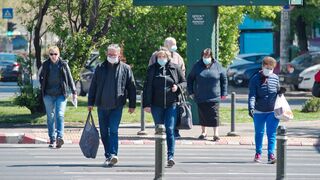Conformity
Peer Pressure Promotes Prevention in Pandemic
As social animals, we are influenced by others in the wearing of masks.
Posted July 31, 2020

Social pressure to influence positive health behaviors during the COVID-19 pandemic is a key tool in decreasing virus outbreaks. Mammals, including humans, respond to outside influences. Early behaviorists such as Pavlov, B.F. Skinner and John Watson promoted the notion of operant conditioning—organisms respond to stimuli, and behaviors become ingrained when stimuli is associated with a behavior.
Most psychology and biology majors remember learning about the conditioning of Pavlov’s dogs. When a bell is rung each time a lab dog gets fed, the dog gets used to or “conditioned” to the bell indicating feeding time. While humans are obviously higher-order mammals, they can be influenced by stimuli as well. In particular, humans will watch and mimic stimuli from others—friends, role models, acquaintances, and celebrities.
Because social influences can be so powerful, it is crucial now, four months into a pandemic due to a highly contagious virus, for all of us to role model hand washing, social distancing, and especially mask-wearing.
Health behavior theorists strongly support the notion that we, as social beings, respond to the behaviors of others. The Theory of Planned Behavior, devised by Icek Ajzen, posits that part of a behavioral depends on “subjective norms,” or whether most people agree about the behavior’s worth, and “social norms,” or whether the behavior is seen as normative within a region or culture.
Similarly, the Social Cognitive Theory, devised by Albert Bandura, notes that people have innate approaches to making a positive health change but that people’s actions are also influenced by others with whom they interact. Behavioral epidemiology—the study of how health behaviors influence disease—demonstrates that some behavior choices occur because an individual makes a decision, or follows a goal, to improve his or her health. But, additionally, social influences can have a strong effect on health behaviors.
Decades ago, most Americans tolerated smoking behavior, seeing it as normative. However, once the Surgeon General reported that smoking was very harmful, the norm began to change. Still, it took time for smoking to decrease, and several decades passed before cigarette ads were banned on television, ashtrays were removed from cars, and smoking was banned in restaurants.
The norms regarding mask-wearing during this pandemic are changing much more quickly, leading to conflict between those who wear masks and those who do not. So, what can lead us to a pro-mask norm? Some countries in the Far East such as Hong Kong and Taiwan have had much fewer residents die of coronavirus since mask-wearing was the norm, even before the coronavirus arrived. In those countries, the residents wear masks to be polite or considerate, a practice that began after the 2009 SARS-CoV outbreak. Encouraging the wearing of masks as a sign of consideration for others is one promising approach.
Another avenue is to encourage high profile persons to wear masks on TV, in ads, and on social media—celebrities have huge influence in the United States. Additionally, large companies such as Walmart and Applebees can be asked to show models wearing masks. We can message our favorite sports figures and ask them to wear masks. And finally, each of us, as individuals, needs to role model mask-wearing. We can change the social norm in a short time if we try, in the service of staving off deaths caused by the virus. Not only can we decrease cases of COVID-19, we might be able to lessen disease severity in Americans for years to come.


